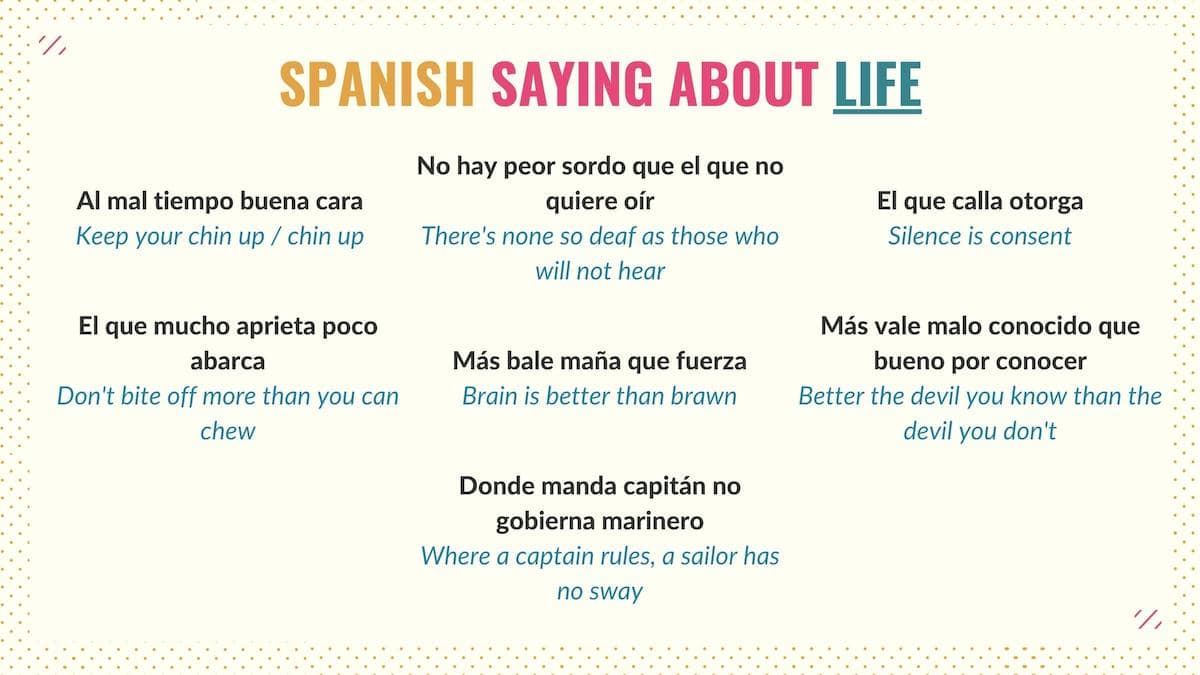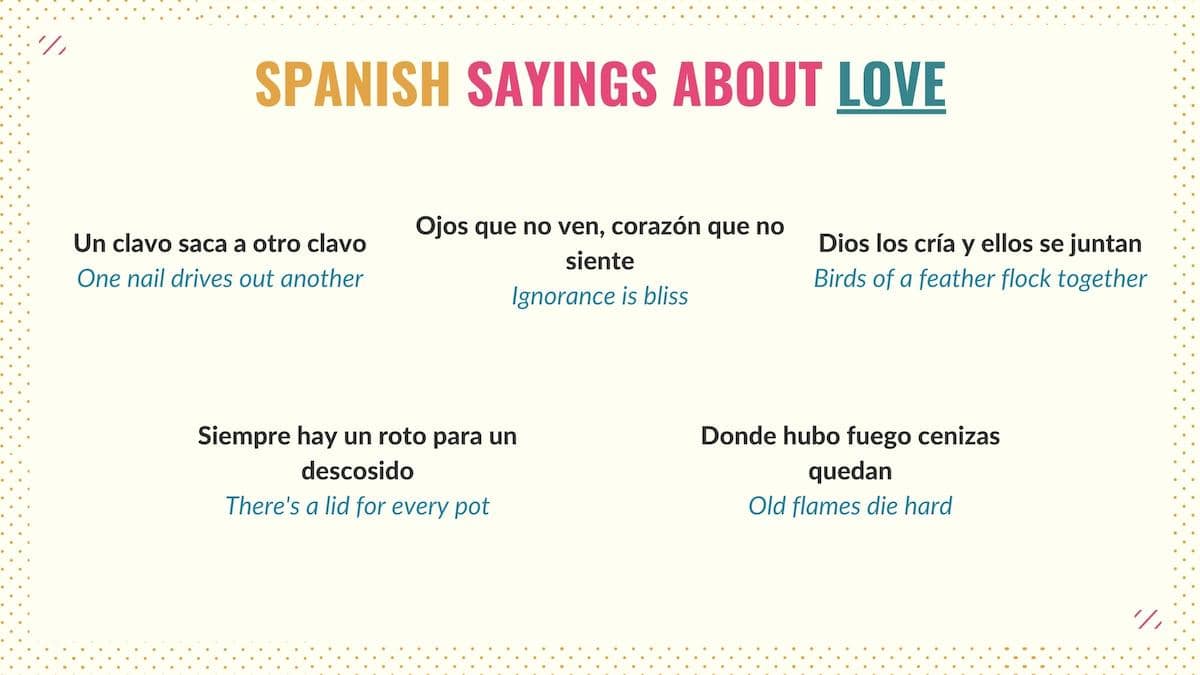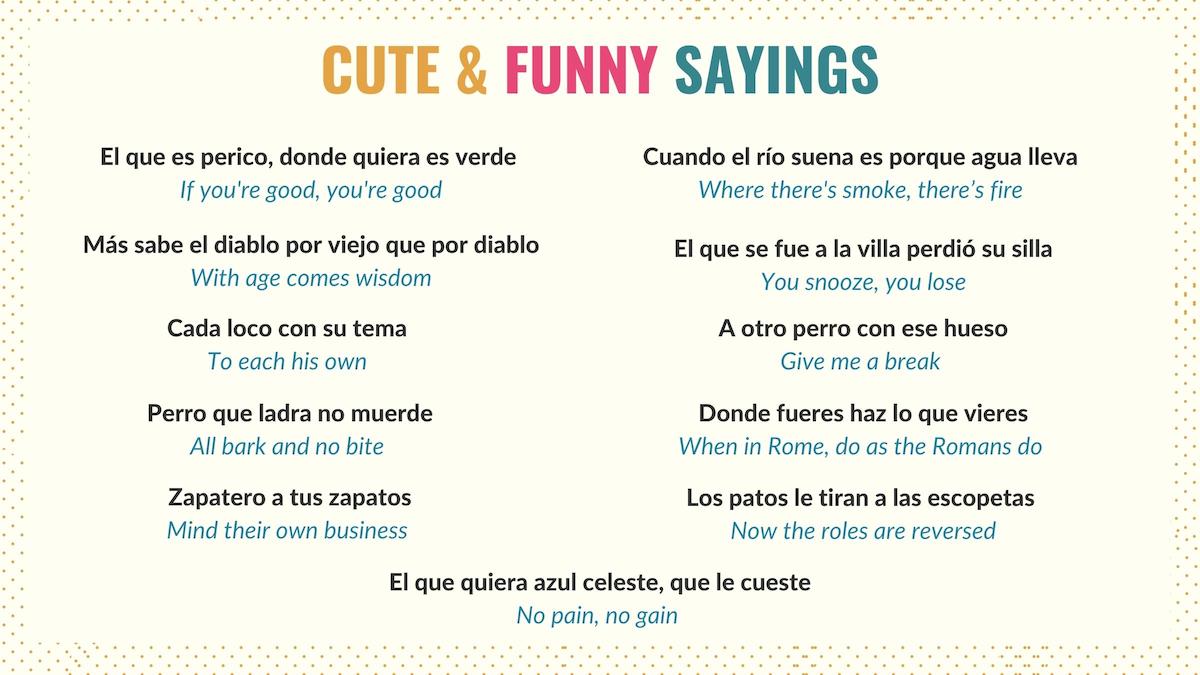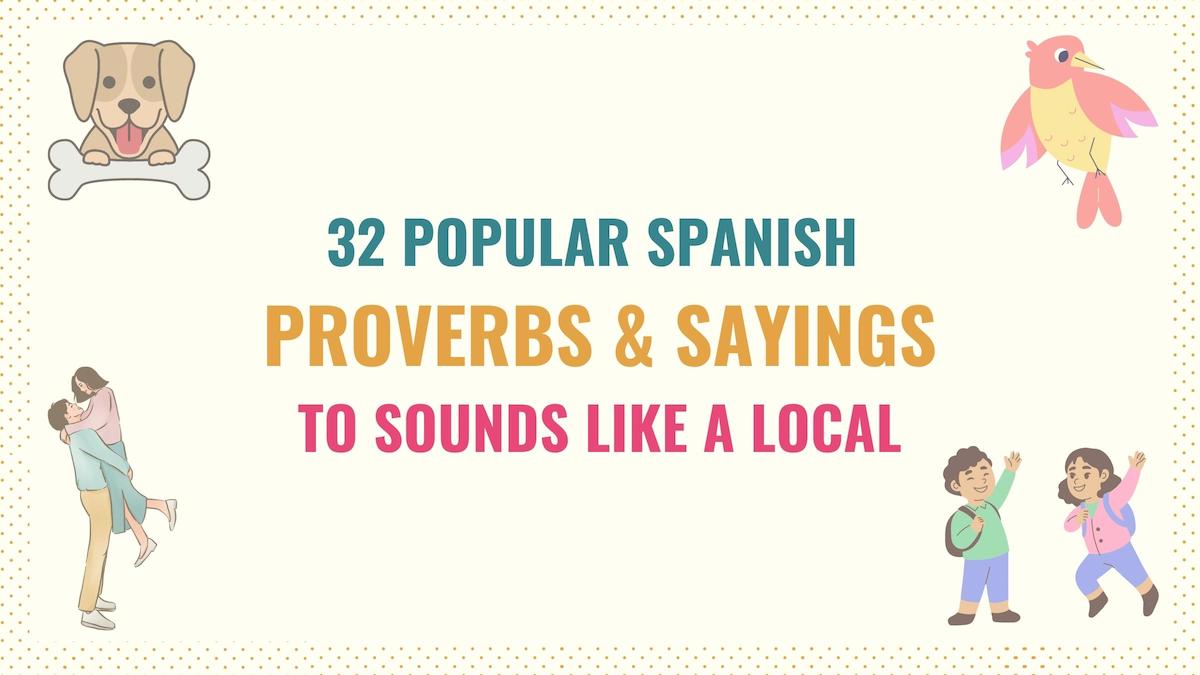Spanish proverbs (also called sayings) are short phrases that contain a piece of wisdom or advice. But on top of the life lessons you may get, proverbs are a great and fun way to understand the Spanish culture while improving your fluency and boosting your vocabulary.
So, with that in mind, this article contains 32 famous proverbs you must know. I’ve included examples and short explanations so you can apply these Spanish phrases correctly.
At the end, you can download a copy of the Spanish sayings PDF which includes all of the proverbs listed below so you can practice them and incorporate them into your conversational repertoire at your own pace.
Take Note: Like jokes or idioms, proverbs in Spanish may not always have a literal translation. These are advanced expressions, so you should try to understand their meaning instead of translating them.
Spanish Sayings About Life

Below are some common proverbs you can use in different life situations. Make sure you read the descriptions to learn how to use them.
1. Lo barato sale caro
Lo barato sale caro communicates that buying cheap things or services turns out to be expensive because you need to spend more money fixing or replacing them. This saying is close in meaning to ‘buy cheap, buy twice’.
No compres un celular usado, lo barato sale caro.
Don’t buy a used phone. Buy cheap, buy twice.
2. Al buen entendedor, pocas palabras
This Spanish phrase implies that an intelligent person doesn’t need long or detailed explanations to understand something. ‘A word to the wise is enough’ is the English equivalent of al buen entendedor pocas palabras.
| Spanish | English |
|---|---|
| Tú: ¿Por qué se enojó mi tía? | You: Why did my aunt get mad? |
| Tu mamá: Al buen entendedor, pocas palabras. | Your mom: A word to the wise is enough. |
3. Al que madruga Dios le ayuda
This proverb expresses that things turn out better when a person has foresight and does his or her tasks on time. Al que madruga Dios le ayuda is close in meaning to ‘the early bird catches the worm’.
| Spanish | English |
|---|---|
| Tú: ¿Por qué estás trabajando tan tarde? | You: Why are you working so late? |
| Tu amigo: Al que madruga Dios le ayuda. | Your friend: The early bird catches the worm. |
4. Camarón que se duerme se lo lleva la corriente
Camarón que se duerme se lo lleva la corriente is usually applied to express that being lazy or not paying attention can lead a person to miss an opportunity. This saying is closely related to ‘you snooze, you lose’.
¡Échale ganas! Camarón que se duerme se lo lleva la corriente.
Give it all! If you snooze, you lose.
5. A lo hecho, pecho
A lo hecho, pecho is a popular saying about life used to remind people that when they’ve done something wrong, the only thing they can do is to face the consequences.
Ni modo. A lo hecho, pecho.
What is done is done.
6. Caras vemos, corazones no sabemos
This Spanish saying communicates that you shouldn’t trust or judge people only based on their appearances. Like other proverbs, this phrase doesn’t have a literal translation, but it’s close in meaning to “don’t judge a book by its cover”.
Nancy se ve amable, pero caras vemos, corazones no sabemos.
Nancy seems nice, but don’t judge a book by its cover.
7. Del dicho al hecho hay mucho trecho
In Spanish, del dicho al hecho hay mucho trecho means that you cannot always trust someone’s word because there’s a significant distance between what a person says and what they do.
| Spanish | English |
|---|---|
| Tú: En serio, esta vez sí te voy a ayudar. | You: I’m serious, this time I’ll help you. |
| Tu amigo: Del dicho al hecho hay mucho trecho. | Your friend: I’ll believe it when I see it. |
8. Dime con quién andas y te diré quién eres
This saying expresses that you can have a good idea of who a person is based on the kind of people they hang out with. It means “tell me who your friends are, I’ll tell you who you are”.
| Spanish | English |
|---|---|
| Tú: Jesús es un buen tipo. | You: Jesus is a good guy. |
| Tu mamá: ¿Sabes con quién se junta? Dime con quién andas y te diré quién eres. | Your mom: Do you know who he hangs out with? Tell me who your friends are, I’ll tell you who you are! |
9. El que anda con lobos a aullar se enseña
In Spanish, we use this saying to say that when you’re surrounded by bad influences you’re likely to adopt their bad habits. This proverb is close in meaning to ‘if you lie down with dogs, you get up with fleas’.
| Spanish | English |
|---|---|
| Tú: Carlos está super cambiado. | You: Carlos has changed a lot. |
| Tu amigo: El que andar con lobos a aullar se enseña. | Your friend: If you lie down with dogs, you get up with fleas. |
10. Al mal tiempo buena cara
Al mal tiempo buen cara can be used to cheer people up and remind them to have a good attitude even when they’re facing difficult situations. This Spanish life-saying can be translated as ‘keep your chin up’ or ‘chin up!’.
¡Ánimo! Al mal tiempo buena cara.
Come on, keep your chin up!
11. No hay peor sordo que el que no quiere oír
No hay peor sordo que el que no quiere oír is a famous Spanish saying that expresses that it’s useless to try to make a person understand when they’re not willing to listen to reason. This proverb can be translated as “there’s none so deaf as those who will not hear”.
Ya no le insistas, no hay peor sordo que el que no quiere oír.
Don’t insist; there’s none so deaf as those who will not hear.
12. El que calla otorga
El que calla otorga implies that when you don’t speak up, you agree with what others say or take responsibility for something. This phrase is closely related to ‘silence is consent’.
¿No vas a decir nada? El que calla otorga.
You have nothing to say? Silence is consent.
13. Más vale maña que fuerza
This saying allows you to express that sometimes skill and intelligence can get you further than physical strength. Más vale maña que fuerza is close in meaning to ‘brain is better than brawn’.
No te desgastes, más vale maña que fuerza.
Don’t tire yourself; brain is better than brown.
14. El que mucho aprieta poco abarca
To advise someone to not do more than they can handle, you can use the Spanish saying el que mucho aprieta poco abarca. This expression is the equivalent of “don’t bite off more than you can chew”.
¿Seguro que puedes? El que mucho aprieta poco abarca.
Are you sure that you can? Don’t bite off more than you can chew.
15. Más vale malo conocido que bueno por conocer
This Spanish proverb is used to warn people that it may be smarter to stick with what you know instead of taking a risk with something that may seem better. “Better the devil you know than the devil you don’t” is its English equivalent.
| Spanish | English |
|---|---|
| Tú: ¿Por qué no calas esta compañía? | You: Why don’t you try this company? |
| Tu amigo: No, más vale malo conocido que bueno por conocer. | Your friend: No, better the devil you know than the devil you don’t. |
16. Donde manda capitán no gobierna marinero
This popular saying is used to remind people of the hierarchy in a certain place.
Donde manda capitán no gobierna marinero. Haz lo que te digo.
Where a captain rules, a sailor has no sway. Do as I say.
Spanish Sayings About Love
Below, you’ll find the most common Spanish proverbs about love.

Take Note: If you’d like to learn different ways to say I love you in Spanish, you should check this article.
17. Ojos que no ven, corazón que no siente
This popular Spanish saying expresses that people cannot be hurt by the things they don’t know or see. This phrase can be translated as ‘ignorance is bliss’.
Decidí no decirle nada. Ojos que no ven, corazón que no siente.
I decided not to tell her anything. Ignorance is bliss.
18. Un clavo saca a otro clavo
After a breakup, Spanish speakers use the saying un clavo saca a otro clavo to encourage their friends to start seeing other people as a way to forget their old love. This phrase is close in meaning to ‘one nail drives out another’ or ‘one devil drives out another’.
¿Por qué no sales con Omar? Un clavo saca a otro clavo.
Why don’t you go out with Omar? One nail drives out another.
19. Dios los cría y ellos se juntan
To express that a couple has similar tastes or behaviors, you can use the saying Dios los cría y ellos se juntan, which means ‘birds of a feather flock together’.
| Spanish | English |
|---|---|
| Tú: A Sandy también le gusta esta película. | You: Sandy also likes this movie. |
| Tu amigo: ¡Ay! Dios los cría y ellos se juntan. | Your friend: Geez! Birds of a feather flock together. |
Take Note: In Spanish, this saying can be also applied to describe a friendship.
20. Siempre hay un roto para un descosido
When it comes to couples, siempre hay un roto para un desconocido communicates that there is someone for everyone. This expression means “there’s a lid for every pot”.
| Spanish | English |
|---|---|
| Tú: ¿Sabías que Beth y Dylan son novios? | You: Did you know that Beth and Dylan are dating? |
| Tu amigo: ¿En serio? Siempre hay un roto para un descosido. | Your friend: Really? There’s a lid for every pot, I guess. |
21. Donde hubo fuego cenizas quedan
Spanish speakers use the saying donde hubo fuego cenizas quedan to express how difficult it’s to forget a meaningful relationship. This expression can be translated as ‘old flames die hard’.
Ustedes todavía se quieren. Donde hubo fuego cenizas quedan.
You guys still love each other. Old flames die hard.
Funny & Cute Spanish Sayings
Although they deliver a piece of wisdom, it doesn’t mean that Spanish proverbs cannot be funny. Below are some amusing and cute sayings that you can add to your vocabulary.

22. El que es perico, donde quiera es verde
El que es perico, donde quiera es verde is a Mexican proverb that expresses that when you’re good at something, you should be able to use those skills regardless of how bad the circumstances are.
No pongas excusas. El que es perico, donde quiera es verde.
Don’t make excuses. If you’re good, you’re good.
23. Más sabe el diablo por viejo que por diablo
This Spanish proverb communicates that wisdom comes with time and experience. As a result, más sabe el diablo por viejo que por diablo is closely related to ‘‘with age comes wisdom’ and is usually applied when advising younger people.
| Spanish | English |
|---|---|
| Tú: ¿Cómo sabías que Joan iba a hacer eso? | You: How did you know that Joan was going to do that? |
| Tu amigo: Más sabe el diablo por viejo que por diablo. | Your friend: With age comes wisdom. |
24. Cada loco con su tema
Cada loco con su tema reminds people that everyone has different interests and, as a result, we must be tolerant towards someone’s passions and likes. This proverb in Spanish means ‘to each his own’.
A mí eso no me gusta, pero está bien, cada loco con su tema.
I don’t like that, but it’s fine. To each his own.
25. Perro que ladra no muerde
This saying implies that a person that threatens is unlikely to take action. Perro que ladra no muerde can be translated as ‘all bark and no bite’.
| Spanish | English |
|---|---|
| Tú: Harry nos dijo que se va a desquitar. | You: Harry told us that he’s going to get even. |
| Tu amigo: No creo, perro que ladra no muerde. | Your friend: I don’t think so, he’s all bark and no bite. |
26. Zapatero a tus zapatos
Zapatero a tus zapatos is a witty way to tell people to mind their own business when they’re giving their opinion without understanding or knowing more about the situation.
| Spanish | English |
|---|---|
| Tú: Deberías comprar un celular que funcione mejor. | You: You should buy a phone that works better. |
| Tu amigo: Zapatero a tus zapatos. | Your friend: Mind your own business. |
27. El que quiera azul celeste, que le cueste
We use el que quiera azul celeste, que le cueste to remind someone that to obtain something, we must work for it. This Spanish saying is the equivalent of ‘no pain, no gain’.
¿Quieres ese carro? ¡Trabaja! El que quiera azul celeste, que le cueste.
Do you want that car? Work! No pain, no gain.
28. Cuando el río suena es porque agua lleva
Cuando el río suena es porque agua lleva is a popular saying Spanish speakers use to express
that there may be some truth in the rumors they hear. This saying is the equivalent of “where there’s smoke, there’s fire”.
| Spanish | English |
|---|---|
| Tú: ¿Crees que sea cierto lo que dicen de la vecina? | You: Do you think everything they say about the neighbor is true? |
| Tu mamá: Cuando el río suena es porque agua lleva. | Your mom: Where there’s smoke, there’s fire. |
29. El que se fue a la villa perdió su silla
This common Spanish saying allows you to express that someone else may take that opportunity if a person is distracted or doesn’t do something quickly. As a result, this saying is the equivalent of ‘you snooze, you lose’.
¿Esta rebanada era tuya? Lo siento, el que se fue a la villa perdió su silla.
Was this slice yours? Sorry, you snooze, you lose.
Take Note: In Castilian Spanish, you may need to use the variation el que se fue a Sevilla perdió su silla.
30. A otro perro con ese hueso
To let someone know that you don’t believe a word of what they’re saying, you can use the Spanish proverb a otro perro con ese hueso. This phrase is close in meaning to ‘give me a break’.
¡Ay, por favor! A otro perro con ese hueso.
Come on, give me a break!
31. Donde fueres haz lo que vieres
Donde fueres haz lo que vieres is used to recommend people adopt the behaviors and traditions of the foreign place they’re visiting or moving to. This Spanish proverb is the equivalent of ‘when in Rome, do as the Romans do’.
| Spanish | English |
|---|---|
| Tú: Quisiera que las calles en México no fueran tan ruidosas. | You: I would like it if Mexican streets weren’t as noisy. |
| Tu amigo: Donde fueres haz lo que vieres. | Your friend: When in Rome, do as the Romans do. |
32 Los patos le tiran a las escopetas
Los patos le tiran a las escopetas is used to point out that two roles have been absurdly reversed. This saying not only refers to hierarchical roles, but also to people who advise others about their behaviors despite having bad habits. Although it doesn’t express the same degree of sauciness, this saying is close in meaning to ‘now the roles are reversed’.
| Spanish | English |
|---|---|
| Tú: El otro día Tim me dio consejos de cocina. | You: The other day Tim gave me cooking advice. |
| Tu mamá: ¿Qué? Ahora resulta que los patos le tiran a las escopetas. | Your mom: What? Now it turns out that the roles are reversed. |
Download the Spanish Proverbs PDF
Now that you’ve learned some common Spanish proverbs, it’s time for you to start adding them in your conversations. I’ve created a PDF you can download to learn these proverbs and sayings at your own pace as you develop your vocabulary and expressions over time.
Proverb-Related Resources to Learn Spanish
To learn Spanish, you need to acquire vocabulary that can help sound more natural. Spanish proverbs are a great start. Here are other key resources you may want to check next.
Spanish interjections are words or small expressions that we use to show our feelings or catch someone’s attention. They’re essential in daily life communication, so make sure you add some of those words to your vocabulary. To sound more natural, you should also learn a few idioms in Spanish.
If you want to improve your speaking skills, make sure to get familiar with some slang terms. For example, if you’re learning Mexican Spanish, you may want to check this guide with the most common Mexican slang words.



